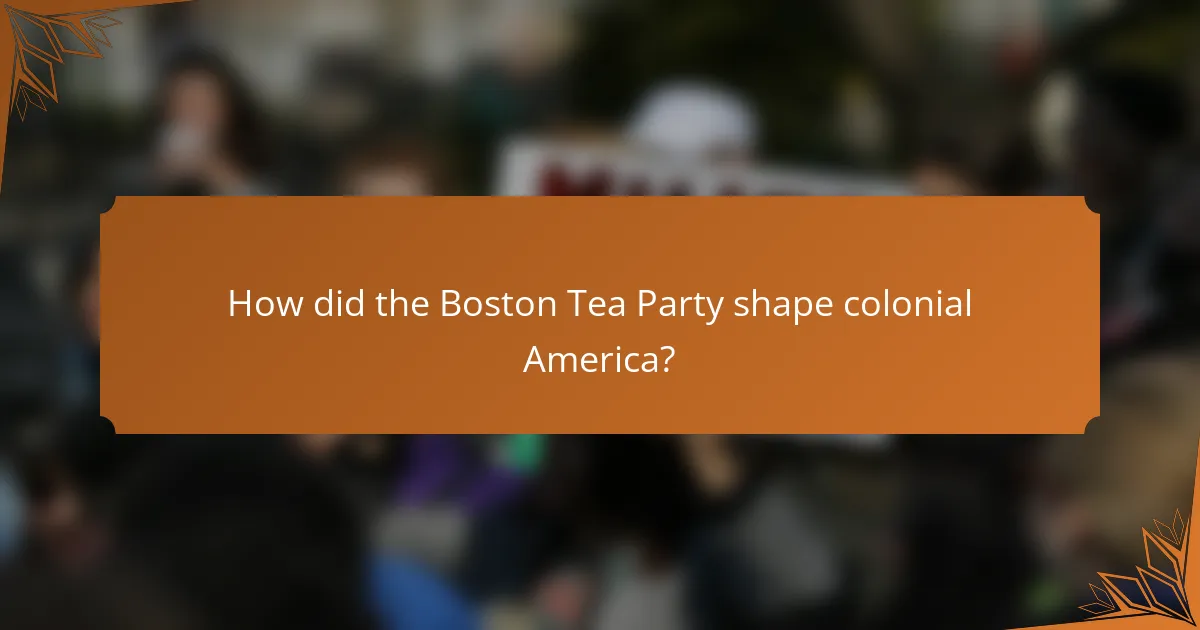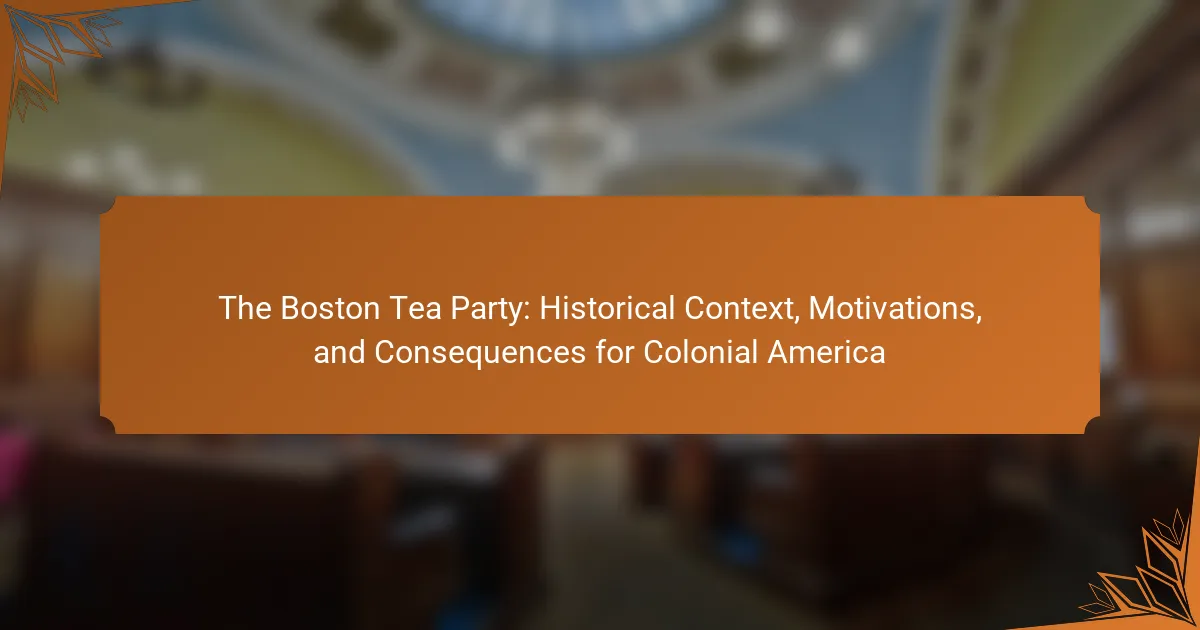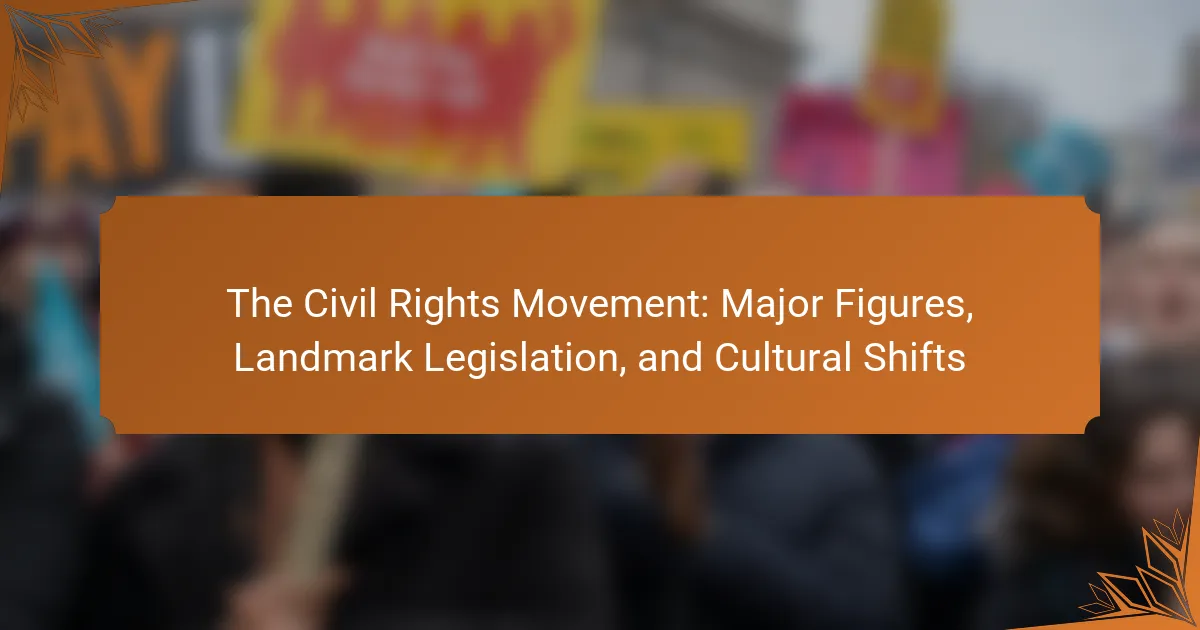The Boston Tea Party was a significant political protest by American colonists against British taxation, occurring on December 16, 1773, in Boston, Massachusetts. Triggered by the Tea Act, which granted the British East India Company a monopoly on tea sales, colonists expressed their frustration by dumping 342 chests of tea into Boston Harbor. This act of defiance escalated tensions between Britain and the colonies and became a catalyst for the American Revolution. The event not only united the colonies against oppressive taxation but also inspired future movements advocating for social justice and political change, solidifying its legacy as a symbol of resistance against tyranny in American history.

What was the Boston Tea Party?
The Boston Tea Party was a political protest by American colonists against British taxation. It occurred on December 16, 1773, in Boston, Massachusetts. Colonists, frustrated by the Tea Act, boarded three British ships. They dumped 342 chests of tea into Boston Harbor. This act of defiance was aimed at challenging British authority. It escalated tensions between Britain and the colonies. The Boston Tea Party became a pivotal event leading to the American Revolution. It demonstrated the colonists’ resistance to oppressive taxation without representation.
What events led to the Boston Tea Party?
The Boston Tea Party was primarily triggered by the Tea Act of 1773. This act granted the British East India Company the right to sell tea directly to the colonies. It allowed the company to undercut local merchants and increase its monopoly. Colonists viewed this as another instance of taxation without representation. The act angered many, leading to protests and boycotts of British goods. Tensions escalated when a group of colonists, calling themselves the Sons of Liberty, organized resistance. In December 1773, they boarded ships in Boston Harbor. They dumped 342 chests of tea into the water as an act of defiance. This event was a significant catalyst for the American Revolution.
What were the key grievances of the colonists?
The key grievances of the colonists included taxation without representation, oppressive laws, and lack of colonial autonomy. Colonists opposed the Stamp Act of 1765, which imposed direct taxes on printed materials. They protested the Townshend Acts of 1767, which taxed everyday items like tea and glass. The Intolerable Acts of 1774 further restricted their rights and freedoms. Colonists felt marginalized by British governance, which ignored their input. They demanded the right to self-govern and fair representation in Parliament. These grievances fueled discontent and ultimately led to the American Revolution.
How did British policies contribute to colonial unrest?
British policies significantly contributed to colonial unrest through taxation without representation and restrictive measures. The Stamp Act of 1765 imposed direct taxes on printed materials, angering colonists who felt they had no voice in Parliament. The Townshend Acts of 1767 further taxed goods like tea, leading to widespread boycotts. The Intolerable Acts of 1774 punished Massachusetts for the Boston Tea Party, escalating tensions. These policies fostered a sense of injustice among colonists, uniting them against British rule. The cumulative effect of these measures was a growing desire for independence and self-governance.
What were the main motivations behind the Boston Tea Party?
The main motivations behind the Boston Tea Party were opposition to British taxation and the desire for colonial self-governance. Colonists were frustrated by the Tea Act of 1773, which granted the British East India Company a monopoly on tea sales in the colonies. This act allowed the company to sell tea at lower prices but still imposed taxes that colonists had no representation to approve. The rallying cry of “no taxation without representation” fueled anger among the colonists. The Boston Tea Party on December 16, 1773, was a direct response to these grievances. Colonists, disguised as Mohawk Indians, boarded British ships and dumped 342 chests of tea into Boston Harbor. This act of defiance was intended to protest both the unfair tax and the broader issue of British control over colonial affairs. The event escalated tensions between Britain and the colonies, ultimately leading to the American Revolution.
Why did the colonists choose tea as their protest item?
Colonists chose tea as their protest item due to its symbolic significance and widespread consumption. Tea represented British taxation without representation. The Tea Act of 1773 granted the British East India Company a monopoly on tea sales in the colonies. This act angered colonists who felt it violated their rights. Tea was a staple beverage, making it an effective choice for protest. The Boston Tea Party in 1773 involved the destruction of 342 chests of tea. This act of defiance highlighted colonial resistance against British authority. The choice of tea underscored the economic and political tensions of the time.
How did economic factors influence the decision to protest?
Economic factors significantly influenced the decision to protest during the Boston Tea Party. The imposition of the Tea Act in 1773 granted the British East India Company a monopoly on tea sales in the American colonies. This act led to increased tea prices, which angered colonists already burdened by taxes without representation. Economic discontent grew as merchants and consumers felt threatened by the loss of their rights and livelihoods. The protest was a direct response to perceived economic oppression. Historical records show that the colonists viewed the act as an attempt to control their economy and limit their economic freedom. The economic motivations were crucial in rallying support for the protest, ultimately leading to the iconic act of defiance against British rule.
What were the immediate consequences of the Boston Tea Party?
The immediate consequences of the Boston Tea Party included heightened tensions between the American colonies and Britain. The British government responded with the Coercive Acts in 1774. These acts, also known as the Intolerable Acts, aimed to punish Massachusetts. The acts closed Boston Harbor until the dumped tea was paid for. They also altered the Massachusetts charter, reducing self-governance. This response united many colonies against British rule. The events escalated into the First Continental Congress later that year. These consequences marked a significant step towards American independence.
How did the British government respond to the protest?
The British government responded to the Boston Tea Party by implementing punitive measures known as the Coercive Acts. These acts were enacted in 1774 as a direct response to the destruction of tea by colonists. The British aimed to assert control over the colonies and deter further acts of defiance. Key provisions included closing Boston Harbor until the tea was paid for. Additionally, the Massachusetts Government Act altered the colony’s charter, reducing self-governance. The Quartering Act required colonists to house British troops. These measures intensified colonial unrest and contributed to the growing revolutionary sentiment.
What actions were taken by the colonists following the event?
The colonists organized protests and boycotts following the Boston Tea Party. They formed the First Continental Congress in 1774 to address grievances. The Congress aimed to unify the colonies against British policies. Many colonists also increased their participation in local committees of correspondence. These committees facilitated communication and coordination among the colonies. Additionally, some colonists engaged in further acts of defiance against British authority. This included the formation of militias and preparation for potential conflict. The actions reflected a growing desire for independence and resistance to British rule.

How did the Boston Tea Party shape colonial America?
The Boston Tea Party significantly shaped colonial America by uniting the colonies against British taxation. It occurred on December 16, 1773, when American colonists protested the Tea Act. This act granted the British East India Company a monopoly on tea sales in the colonies. Colonists viewed this as unfair taxation without representation. The event led to widespread outrage and organized resistance among the colonies. In response, the British government enacted the Coercive Acts in 1774, which further escalated tensions. The Boston Tea Party is considered a catalyst for the American Revolution. It inspired other acts of defiance against British rule, fostering a spirit of independence.
What impact did the Boston Tea Party have on colonial unity?
The Boston Tea Party significantly enhanced colonial unity. It united the colonies against British taxation policies. The event galvanized public opinion and resistance to British rule. Colonists from various regions coordinated their actions in response. The formation of the First Continental Congress followed, showcasing this unity. This collective action laid the groundwork for the American Revolution. The Boston Tea Party became a symbol of resistance. It fostered a shared identity among the colonies against a common adversary.
How did the event influence the formation of colonial alliances?
The Boston Tea Party significantly influenced the formation of colonial alliances by uniting disparate colonies against British rule. The event galvanized colonial resistance and fostered a sense of shared purpose among the colonies. It led to the formation of the First Continental Congress in 1774, where representatives from twelve colonies convened to discuss coordinated responses to British policies. This gathering established a framework for collaboration and mutual support against perceived injustices. The collective outrage over the tea tax and the destruction of tea further solidified alliances among the colonists. As a result, the Boston Tea Party served as a catalyst for increased communication and cooperation between the colonies, ultimately paving the way for a united front in the struggle for independence.
What role did propaganda play in shaping public opinion?
Propaganda played a significant role in shaping public opinion during the period leading up to the Boston Tea Party. It was used to rally colonists against British taxation policies. Pamphlets, such as those by Samuel Adams, spread anti-British sentiments. These writings emphasized the injustice of taxation without representation. The Boston Massacre was also depicted through propaganda to incite outrage. Visual imagery, like Paul Revere’s engraving, portrayed British soldiers as brutal oppressors. This portrayal galvanized support for the colonial cause. Overall, propaganda effectively mobilized public sentiment against British rule, contributing to the revolutionary spirit.
What were the long-term consequences of the Boston Tea Party?
The long-term consequences of the Boston Tea Party included increased tensions between Britain and the American colonies. The event led to the implementation of the Coercive Acts in 1774. These acts aimed to punish Massachusetts and included closing Boston Harbor. The punitive measures united the colonies against British rule. This unity fostered the formation of the First Continental Congress. The Boston Tea Party also escalated calls for independence. It became a symbol of resistance against tyranny. Ultimately, these consequences contributed to the outbreak of the American Revolutionary War in 1775.
How did the event contribute to the American Revolution?
The Boston Tea Party significantly contributed to the American Revolution by escalating tensions between the American colonies and British authorities. This protest against the Tea Act of 1773 involved colonists dumping 342 chests of British tea into Boston Harbor. The event symbolized colonial resistance to British taxation without representation. It united various colonial factions against perceived British oppression. In response, the British government enacted the Coercive Acts, which further inflamed colonial dissent. This escalation led to the formation of the First Continental Congress in 1774. The Congress coordinated colonial responses and fostered a collective identity among the colonies. Ultimately, the Boston Tea Party served as a catalyst for revolutionary sentiment and action across America.
What lessons were learned by the colonists from this protest?
The colonists learned the importance of unity and collective action from the Boston Tea Party. This protest demonstrated that organized resistance could challenge British authority effectively. It highlighted the effectiveness of nonviolent protest as a means to express dissent. The event also taught the colonists that their economic power could influence political change. The colonists realized that they needed to communicate their grievances more clearly. They understood the necessity of forming alliances with other colonies for greater impact. The Boston Tea Party underscored the significance of standing up against unjust laws. Lastly, it encouraged the colonists to prepare for further actions in their struggle for independence.

What is the legacy of the Boston Tea Party today?
The legacy of the Boston Tea Party today is its enduring symbol of resistance against tyranny. This event sparked a wave of protests and organized actions that contributed to the American Revolution. It represents the importance of civic engagement and the right to challenge government policies. The Boston Tea Party also inspired future movements advocating for social justice and political change. Its principles of liberty and self-determination resonate in contemporary discussions about democracy. The event is commemorated annually, reinforcing its significance in American history. Educational institutions often highlight its role in shaping national identity. Overall, the Boston Tea Party remains a pivotal moment in the narrative of American freedom.
How is the Boston Tea Party commemorated in modern times?
The Boston Tea Party is commemorated through various events and educational programs. Annual reenactments take place at the Boston Tea Party Ships and Museum. These reenactments attract thousands of visitors each year. They provide insights into the historical significance of the event. Educational programs focus on the principles of democracy and protest. The museum also features artifacts from the original event. Local schools often include lessons about the Boston Tea Party in their curriculum. Additionally, public discussions and lectures are held to explore its impact on American history.
What significance does the event hold in American history?
The Boston Tea Party is significant in American history as a pivotal act of resistance against British taxation. This event occurred on December 16, 1773, when American colonists, frustrated by the Tea Act, dumped 342 chests of British tea into Boston Harbor. It marked a turning point in colonial opposition to British rule. The Boston Tea Party galvanized public opinion against the British government. It led to the imposition of the Coercive Acts, which further united the colonies. This unity ultimately contributed to the outbreak of the American Revolutionary War. The event symbolizes the fight for American independence and the principle of self-governance.
How has the Boston Tea Party influenced contemporary protest movements?
The Boston Tea Party has significantly influenced contemporary protest movements by demonstrating the power of collective action against perceived injustice. The event exemplified how organized resistance can challenge authority and provoke change. It inspired future movements by establishing a framework for civil disobedience. Protesters today often cite the Boston Tea Party as a pivotal moment in the fight against oppression. Historical parallels can be drawn between this event and modern protests advocating for social justice. The Tea Party’s legacy includes the idea that symbolic acts can galvanize public support. Moreover, it highlights the importance of grassroots mobilization in effecting political change. Overall, the Boston Tea Party serves as a foundational example for contemporary activists seeking to challenge systemic issues.
What can we learn from the Boston Tea Party?
The Boston Tea Party teaches us about the power of collective action against perceived injustice. It highlights the importance of civic engagement in challenging authority. The event demonstrated that citizens could unite to resist policies they viewed as oppressive. In December 1773, American colonists protested against British taxation without representation. They boarded ships and dumped 342 chests of tea into Boston Harbor. This act of defiance galvanized public opinion and sparked further resistance. It ultimately contributed to the American Revolution. The Boston Tea Party serves as a historical example of grassroots activism leading to significant political change.
How can the principles of the Boston Tea Party apply to current social movements?
The principles of the Boston Tea Party can apply to current social movements through acts of civil disobedience and protest against perceived injustices. The Boston Tea Party was a response to taxation without representation. This principle resonates with modern movements that challenge governmental policies viewed as unfair.
Social movements today often mobilize people to take collective action. They seek to raise awareness and demand change, similar to the colonists’ actions in 1773. The Boston Tea Party demonstrated the power of grassroots organizing. It highlighted the effectiveness of direct action to influence political change.
Moreover, the event emphasized the importance of solidarity among participants. Current social movements, such as those advocating for climate action or racial equality, also rely on community support. They aim to disrupt the status quo, just as the Boston Tea Party disrupted British trade.
In summary, the Boston Tea Party serves as a historical example of how organized protests can challenge authority and advocate for rights. This legacy continues to inspire contemporary social movements seeking justice and equality.
What strategies used during the Boston Tea Party can be relevant today?
The strategies used during the Boston Tea Party that remain relevant today include organized protest and civil disobedience. Organized protest effectively mobilizes communities to address grievances. The Boston Tea Party involved a large group of colonists uniting against British taxation without representation. Civil disobedience, exemplified by the destruction of tea, highlights the power of nonviolent resistance. Such actions can draw attention to social and political issues. Today, movements like Black Lives Matter utilize similar tactics to challenge systemic injustices. The Boston Tea Party demonstrated that collective action can lead to significant political change. Historical context shows that these strategies can influence public opinion and policy.
The Boston Tea Party was a pivotal political protest by American colonists against British taxation, occurring on December 16, 1773, in Boston, Massachusetts. Triggered by the Tea Act, the event involved colonists dumping 342 chests of tea into Boston Harbor as an act of defiance against British authority and taxation without representation. The article explores the historical context leading to the protest, key grievances of the colonists, British responses, and the long-term consequences that contributed to the American Revolution. It also examines the impact of the Boston Tea Party on colonial unity, contemporary protest movements, and the lessons learned from this significant act of resistance.



